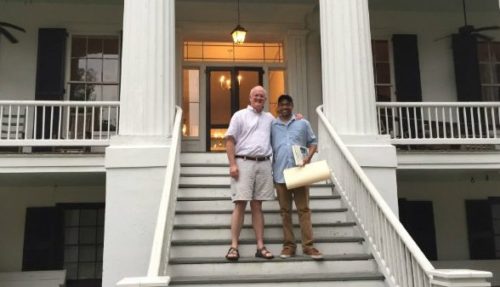We’ll start off this Saturday evening’s episode of the Saturday Six Pack with Canton writer Nkrumah Steward. If Steward’s name sounds familiar, it’s likely because a recent story of his, about traveling back to the South Carolina plantation where his ancestors had been slaves, has spread like wildfire this past week. From People Magazine to ABC News, the story of Steward’s decision to initiate face-to-face dialogue with the current owner of the plantation, Robert Adams, a descendant of the individuals who had enslaved his family, has now been shared tens of thousands of times on social media. [The two men, as it would turn out, also happen to be distant cousins thanks to the fact that, in 1835, Steward’s 4th great grandmother, a slave named Sarah Jones Adams, had a child by Robert Adams, the man who claimed ownership over her.] If you’ve yet to hear Steward’s story, I’d encourage you to start with his blog, and then move on to Epoch Times, which has some of the better coverage I’ve seen thus far. And, of course, tune in this Saturday evening, when Steward and I will be speaking at length about the time he spent with Adams at Wavering Place Plantation, what he’s come to learn from the experience, and why it is, in his opinion, that the story of his journey seems to be resonating so strongly with people right now.
[above: Adams and Steward on the steps of Wavering Place Plantation in South Carolina.]
And, during our second segment, African-American Washtenaw County Sheriff’s Department Deputies Eugene Rush, Jeremiah Richardson, and LaShane Bynum, and AAPD officer Jason Gold, will be joining me and Derrick Jackson to discuss what it’s like to be “black and blue” in today’s America.
Then, during our final segment, if all goes according to plan, we’ll be welcoming Detroit police detective Ira Todd into the studio to discuss the case of Davontae Sanford, the young man who was just recently released from prison after serving eight years for four homicides that he did not commit. Todd, as you might recall, is the detective credited with getting hitman Vincent Smothers to confess to the four murders, opening the door to the release of Sanford. Here, if you haven’t read it, is a clip from the New Yorker story from October 2012 that introduced the nation to the Davontae Sanford case. [It still amazes me that Sanford stayed in prison another three and a half years after this story ran.]
…Ten hours later, (Vincent Smothers) was at the Schaefer police station, in Detroit, in a room with a square wooden table and two black plastic chairs. He had been brought in to talk with Ira Todd, a member of the city’s Violent Crimes Task Force.
“What’s going on with you, man?” Todd asked.
“Nothing much,” Smothers answered quietly. A video of the interrogation showed him folding himself into the seat, his hands cuffed behind him. His hair was dishevelled, and he had thin sideburns and a mustache. He was wearing shorts and a black T-shirt.
“I’ve been talking to a lot of people about you, my friend,” Todd said, as he set up a camera to take pictures of Smothers.
“O.K.”
“You’ve got troubles.”
“O.K.”
“Major troubles. I figure you already know that,” Todd said. “We know that you are, per se, a hit man, a contract hit man,” he went on. “We know that you and somebody else were responsible for trying to take out three people—one girl that lived and she pointed you out.”
Smothers listened.
“We know that you killed a cop’s wife,” Todd continued. “We know that the cop hired you.” He said that Cecily had told the police about Rose Cobb’s murder, and was showing them weapons that Smothers had asked her to stash. But she had also emphasized that he was a great father to their children. If he coöperated, Todd would talk to the prosecutor on his behalf.
“I’m willing to talk to you about everything,” Smothers assured him. He asked what kind of trouble Cecily was in, and Todd hedged, telling him that asking her to hide weapons was a bad idea. If Smothers talked, he said, “I give you my word that we’ll look out for you.” Smothers cut him off, making clear that he wasn’t worried about himself; he wanted to make sure Cecily didn’t end up behind bars. “I can do forever,” he said. “But I couldn’t live with myself if she wasn’t able to raise those two little girls.”
Over the next twenty hours, Smothers talked. He combed through his memory, trying to keep the order of his hits straight. Toward the end of the interview, he mentioned the killing on Runyon Street.
“Did you hit somebody in there?” an officer asked.
“Yes,” Smothers responded.
“Male or female or what?”
“Three guys and, I believe, there was a female in the house.” Smothers described the scene in detail, mentioning that he had talked to a young boy before leaving with two thousand dollars, half a pound of marijuana, and a .40-calibre pistol—the one he said he later used to kill Rose Cobb.
“I really believe that Smothers was giving me the one-hundred-per-cent truth,” Todd told me. The information that Smothers gave about the eight other hits checked out. Todd has interrogated several hit men, but, he said, “Vincent was the first one I ever talked to who seemed human. You literally walked away saying, ‘Oh, my God, what happened to this kid?’ ”
As Smothers was finishing his confession, he asked to use the bathroom, and a sergeant, Michael Russell, escorted him there. Smothers told me that Russell said, “You said you did the Runyon job. That’s impossible. We got the guy.” (Russell denies having the conversation.) Surprised to have his confession second-guessed, Smothers gave details, mentioning the people in the living room and his discussion with Glover in the back room. “He looked flabbergasted,” Smothers told me. “He said, ‘A kid confessed to it.’ ” Seven months before, a young teen-ager named Davontae Sanford had told the police that he was responsible for the killings. “I said, ‘Wow, that’s really messed up,’ ” Smothers told me. “He wasn’t there.”…
And, assuming he’s willing to talk about it, I’d also like to ask Todd about his investigation into the 2003 murder of exotic dancer Tamara “Strawberry” Greene, his work on the AMC show Low Winter Sun, and his efforts to exonerate David Beeks, another man wrongly convicted of murder in Detroit. But we’ll have to see how much time we’ve got.
FOR THOSE OF YOU WHO HAVE NEVER TUNED IN TO THE SIX PACK BEFORE, HERE ARE THE DETAILS ON HOW TO LISTEN:
Unless you live inside the AM 1700 studio, chances are you won’t be able to pick the show up on your radio. As that’s the case, I’d recommend streaming the show online, which you can do either on the AM1700 website or by way of TuneIn.com.
And for those of you who aren’t yet familiar with the show, and need to get caught up, you can listen to the entire archive on iTunes.
Oh, and if you’d like to tell your friends and neighbors about the program, feel free to share the Facebook event listing.
And, here, thanks to AM 1700 senior graphic designer Kate de Fuccio, is this week’s poster, in case any of you want to print copies and leave them at one of your favorite highway rest areas.
And do call us if you have a chance. We love phone calls. So please copy down this number and slide it into your sock – 734.217.8624 – and call us between 6:00 and 8:00 this Saturday evening. The show is nothing without you.















6 Comments
A few people will listen to this show.
Sounds like a good one.
Will you be bringing up former Police Chief Ralph Lloyd Godbee Jr.’s quote: “I’m disappointed in how black police officers are not standing up. There should be a war within law enforcement”?
Mark, are the recordings of these shows still available?
Never mind, Mark. I was able to access this episode #48 in the iTunes archive.
Trailer: Retired Detroit Homicide Detective Stars In Season 2 Of ‘Wrong Man’ On STARZ
https://www.deadlinedetroit.com/articles/24486/trailer_retired_detroit_homicide_detective_stars_in_season_2_of_wrong_man_on_starz
(From: Deadline Detroit)